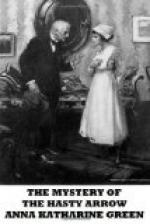“Let me have a moment in which to recover myself,” she prayed, covering her eyes with her hand. Then, while all waited, she gave a low cry, “I suffer; I suffer!” and leaped to her feet, only to sink back again inert and powerless. But only for an instant: with that one burst of extreme feeling she recovered her self-control, answering with apparent calmness the detective’s question:
“I was passing through the gallery as any other visitor might, when a young lady rushed by me—stopped short—threw up her arms and fell backward to the floor, pierced to the heart by an arrow. In a moment I was on my knees at her side with hand outstretched to withdraw this dreadful arrow. But I was afraid—I had heard that this sometimes causes death, and while I was hesitating, that vision came, engulfing everything. I could think of nothing else.”
She was near collapsing again; but being a woman of great nerve, she fought her weakness and waited patiently for the next question. It was different, without doubt, from any she had expected.
“Then you positively deny any active connection with the strange death of this young girl?”
A pause, as if to take in what he meant. Then slowly, impressively, came the answer:
“I do.”
“Did you see the person who shot the arrow?”
“No.”
“From what direction would it have had to come to strike her as it did?”
“From the opposite balcony.”
“Did you see anyone there?”
“No.”
“But you heard the arrow?”
“Heard?”
“An arrow shot from a bow makes a whizzing sound as it flies. Didn’t you hear that?”
“I don’t know.” She looked troubled and uncertain. “I don’t remember. I was expecting no such thing—I was not prepared. The sight of an arrow—a killing arrow—in that innocent breast overcame me with inexpressible grief and horror. If the vision of my husband had not followed, I might remember more. As it is, I have told all I can. Won’t you excuse me? I should like to go. I am not fit to remain. I want to return home—to hear from my husband—to learn by letter or telegram whether he is indeed dead.”
Mr. Gryce had let her finish. An inquiry so unofficial might easily await the moods of such a witness. Not till the last word had been followed by what some there afterward called a hungry silence, did he make use of his prerogative to say:
“I shall be pleased to release you and will do so just as soon as I can. But I must put one or two more questions. Were you interested in the Indian relics you had come among? Did you handle any of them in passing?”
“No. I had no interest. I like glass, bronzes, china—I hate weapons. I shall hate them eternally after this.” And she began to shudder.
The detective, with a quick bend of his head, approached her ear with the whispered remark:
“I am told that when your attention was drawn to these weapons, you fell on your knees and murmured something into the dead girl’s ears. How do you explain that?”




